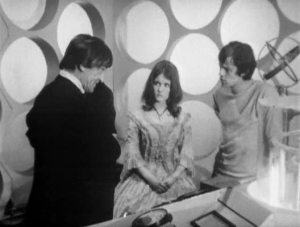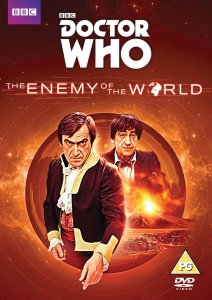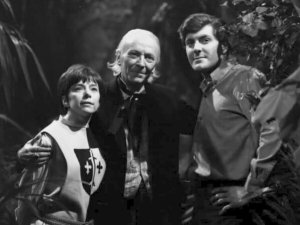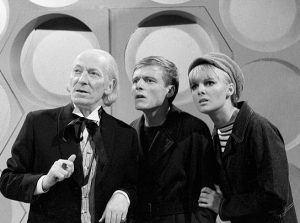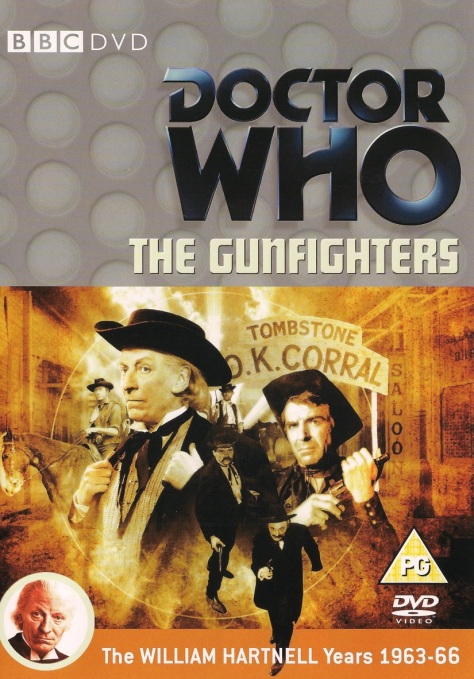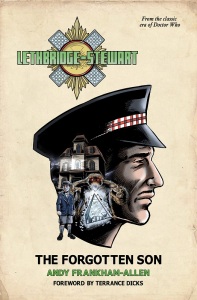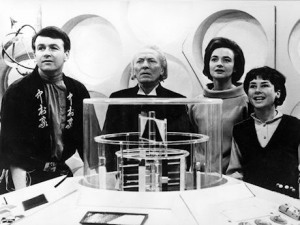For the second instalment in the Lethbridge-Stewart interview range we
are pleased to visit with Welsh comic-artist Simon Williams, who provides the
art for the cover of the first Lethbridge-Stewart
novel, The Forgotten Son.
Welcome,
Simon. Before we get to your involvement with The Forgotten Son let’s take a quick look at your background with
art and comics. What was the first comic you ever read?
Thanks, Chris. The first comic I can remember
reading was Might World of Marvel issue #231,
waaaaayyyyyy back in 1977! It was a UK Marvel weekly, reprinting various US
titles. This issue featured among others, a reprint of the US Incredible
Hulk #198… written by Len Wein, with
artwork by Sal Buscema and Joe Staton. With that issue, I became a life-long
fan of the Incredible Hulk, and it was Sal's artwork that inspired me to want
to draw comics. Two fun facts about this issue… The back-up strip was a reprint
of Marvel US's Planet of the Apes
magazine, and the UK editor at the time was Neil Tennant (of Pet Shop Boys
fame)!
How much
influence did reading comics and seeing their artwork have on your development
as an artist?
I can't put into words the influence those comics
had on me. Not only as an artist, but my life as a whole. I learned to read
with comics, especially Marvel. All I've ever wanted to do was draw comics.
You count
artists such as Sal and John Buscema, John Romita Sr and John Byrne as being
some of your major inspirations. What is it about their art that you found appealing
and how has their style inspired yours?
Well, Sal's artwork was the first to stand out for
me. With the Hulk being my favourite character, and Sal being the artist on the
book for over one hundred issues, I read more of his work than anyone else’s.
At the time I started reading comics, you had Sal on Hulk, Marvel UK were reprinting John Romita Spider-Man stories, John Buscema on Conan and The Fantastic Four… and John Byrne's run on Uncanny X-Men. To me, the Buscemas, Romita and, of course,
Jack Kirby were the masters and innovators of the classic Marvel style. Brilliant
draftsmen who could not only draw, but were master storytellers as well. John
Byrne was one of the first of the new wave of ‘hot’ artists (along with the
likes of Frank Miller) to follow in their footsteps, who carried on that
tradition of classic storytelling and art, while maintaining modern
sensibilities.
And in a few
words how do you describe your personal artistic style?
Classic, Retro, Marvel!
You have said
that you broke into comics thanks to Panini editor Alan O’Keefe, who contacted
you in 2003 after noticing your art portfolio online. First, tell us a little
bit about that portfolio. What were some of the art subjects and do you have
any particular favourite pieces from that collection?
I can remember that there were several Hulk pieces
on there… as well as several pages from my original Discotronic
Funk Commandos strip, which I created
back in 1996. I do tend to cringe when looking at my old work (especially stuff
that I drew nearly 15 years ago!), but those early DFC pages feature some work that I still feel holds up to this day.
Now, once
Alan O’Keefe noticed your work he offered you a chance to draw for the then-new
Transformers: Armada title. You later
contributed art to titles such as Action
Man, Spectacular Spider-Man and Marvel Heroes. Looking back on your
entry and first years as a comic artist, what do you feel are the most valuable
experiences or lessons you learned as an artist?
Well, the first thing I have to say is how grateful
I am to Alan and the Panini guys for giving me my start as a professional in
comics. Working with editors Ed Hammond, Brady Webb, Tom O'Malley and Rob Jones
was an absolute joy. In my first year, I got to achieve two of my life-long
ambitions: to draw the Incredible Hulk… and to draw a Hulk vs Thing battle
(with Spider-Man thrown into the mix)! As for what I've learnt from back then;
I'd say as an artist that you never stop learning. I still learn something new
to this day.
In 2009 you
generated a lot of fan and professional excitement by drawing and posting
online a comic series that featured a showdown between the Hulk and Death’s
Head, a robotic bounty hunter – or as he
calls himself, ‘a freelance peace-keeping agent’ – first created in Marvel UK’s
Transformers comic in 1987. Tell us a
little about that artistic experience and also your thoughts on why the project
attracted so much positive attention.
That project started out just for fun. I have
always loved the character of Death's Head, and always hoped to see him fight
the Hulk back in the old Marvel UK days (after all, he met and fought the
Transformers, the Fantastic Four, Iron Man and even the Doctor!). So I decided
to draw up some pages to post on my deviantArt page, again just for fun! However,
people really started to take an interest in this strip, so I decided to finish
it as part of my convention exclusive Soulman Inc Sketch Book. I never dreamt that it would actually lead to the real thing, where Marvel
Heroes editor Ed Hammond told me that
they were going to do a Hulk/Death's Head strip, with me on artwork and Death's
Head creator Simon Furman writing! It was genuinely a dream come true.
In recent
years you created the comic title Retro
Tales – Discotronic Funk Commandos for the Retro Comics Group. Tell us a
little about the vision of Retro Comics and this superhero team’s place in your
own comic book world.
Retro Tales is my love-letter to ‘70s Marvel Comics. I
created the Discotronic Funk Commandos
back in 1996 (although back then they were called the Funktastic Four). I always had this crazy idea about superheroes
and villains based of ‘70s disco musicians/bands. It's a comedy strip, but
played straight (much akin to the classic Batman TV series starring Adam West and Burt Ward). My style of artwork has
always been compared to the ‘70s/’80s style Marvel comics, so I decided to use
the Funk Commandos as the main characters of Retro Tales, written and drawn in a retro comic-book
style.
Last year
Retro Comics debuted two new characters, The Hoff and Thor, the Rock Warrior.
Both creations are based on two real-life pop culture icons: American actor
David Hasselhoff and Canadian heavy metal frontman Jon Mikl Thor, respectively.
How did their involvement into your comic title come about, and how has it been
for you as a comic creator and artist working with these two men in translating
their real-life personalities into the comic book world?
Working with both Jon and David has been an
absolute dream come true! I'm a huge fan of the band Thor (and often draw
listening to their music!), and have been a long-time fan of the Hoff. My
collaborations with both started by correspondence online, and since have met
David several times. I'm hoping to meet Jon sometime this year, as I believe he
will be in the UK promoting his new bio-pic I Am Thor.
Let’s return
briefly to Death’s Head. It is little-known in Marvel Comics lore that Death’s
Head has a comic connection with a certain Time Lord known as the Doctor, a
fact which you have mentioned in previous interviews. Growing up, were you ever
a fan of Doctor Who, and if so, did
you ever watch the 1970s stories featuring UNIT and Brigadier
Lethbridge-Stewart?
I certainly did! Doctor Who is a definite favourite of mine. Tom Baker being the Doctor I grew up
with. Now, thanks to the DVDs and television repeats, I have seen most of the
UNIT episodes featuring Jon Pertwee, and of course the wonderful Nicholas
Courtney, whose character of the Brigadier is one of my absolute favourites!
You are the cover
artist for The Forgotten Son, which
is the first instalment in the upcoming Lethbridge-Stewart novel series
published by Candy Jar Books. How did you first become involved in this
project? Is it your first time drawing cover art for stories as opposed to
comic book story art?
I was approached for the project by range editor
and Forgotten Son author Andy
Frankham-Allen, who is a very good friend of mine. I have always wanted to draw
something related to Doctor Who
professionally, and when I heard it was the Brigadier I was over the moon! This
is my first time drawing covers for a novel, but I couldn't think of anything
better to start with!
Although The Forgotten Son won’t be available
until 22 February your art for the book is already viewable online. In the
image we see the profile of Colonel Lethbridge-Stewart, a young boy in somber
clothes, an ominous house and a Yeti hovering over a glowing pyramid. Without
giving away any details of the actual story, what can you tell us about your design
for this cover and what helped to inspire you in its drawing?
The design of the cover was something I discussed
with Andy Frankham-Allen, and Candy Jar publisher Shaun Russell. I told them to
give me the specific elements that they wanted me to incorporate onto the cover,
and of course what style they would like. I was pretty adamant though about the
Brig being prominent on the cover; something both Andy and Shaun were in full
agreement with!
Finally, and
again without giving too much away, will this be your only cover for this book
range or can we except more of your art covering the world of Lethbridge-Stewart?
As it stands right now, I'll be doing more covers
for this series! I'm awaiting more news from Mr Frankham-Allen on this, but I
should be starting on the next one very soon!
Simon
Williams, thank you.
Artwork ©
Simon Williams, All Rights Reserved


